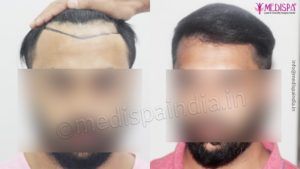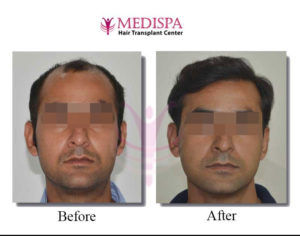
Hair loss in women is often met with significant criticism and can lead to feelings of depression, as hair is considered a valuable aspect of beauty and personal identity. Women experiencing hair loss may encounter serious personal challenges, including mental health issues stemming from diminished social interactions due to feelings of embarrassment.
Pattern for hair loss in females
The pattern of hair loss in females differs significantly from that observed in males. Females typically do not experience complete baldness; instead, they often encounter central thinning that gradually expands the parting and exacerbates hair loss. In women, a receding hairline is generally not a characteristic feature, and temporal triangles do not develop. Conversely, in males, hair loss affects both the frontal and vertex regions, leading to extensive bald areas while leaving a band of hair around the back and sides of the head in more advanced stages.
Hair loss treatment in females: the need for hair transplant
Women often pursue various potential remedies for hair loss, influenced by recommendations from family and advertisements. The market offers a range of products, both natural and synthetic, that assert their effectiveness in halting hair loss. While these treatments may provide temporary relief for hair thinning, they cannot prevent permanent hair loss.
Numerous medications for hair loss are accessible, including:
- Minoxidil (Rogaine): This over-the-counter topical solution is designed to fortify hair shafts and slow the progression of hair loss.
- Finasteride: Available only by prescription, these oral tablets aim to decrease hair loss rates and stimulate hair regrowth by inhibiting the production of the DHT metabolite and moderating testosterone metabolism.
These medications may yield positive results for some individuals, but success is not guaranteed. Physicians typically recommend that patients experiencing hair loss or early baldness explore pharmaceutical options prior to considering surgical interventions.
When other treatments prove ineffective, hair transplants may be considered as a viable solution for hair loss. This minimally invasive procedure demands a high level of precision, as it involves relocating hair follicles from a donor site selected based on the density of hair in the balding area. It is important to note that this procedure does not regenerate lost hair follicles; rather, its objective is to enhance hair density by transferring follicles from areas of high density to those that are bald.
The primary techniques for hair transplantation, FUT and FUE, are employed to extract grafts for both men and women. Female hair transplants differ from male procedures in certain respects. Given that the pattern of hair loss in women varies from that in men, female transplants necessitate greater precision. Women are generally discouraged from shaving their heads, as baldness may be perceived negatively. Consequently, small incisions are made without shaving the head, and these openings are subsequently filled with hair follicles.
It is essential to exercise significant caution, as any negligence could adversely affect the existing hair roots in the vicinity. Female hair transplant necessitates a high level of precision due to their complexity. The hairlines of women differ from those of men, particularly as women’s receding lines from the temporal triangles are typically filled in. Achieving a natural appearance in female patients demands exceptional skills and expertise, which is why the hair transplant cost in India tends to be higher for women than for men.
Medispa hair transplant clinic pioneered the practice of performing hair transplants on women in Delhi and Jaipur. We are committed to delivering the most aesthetically pleasing hair transplant results while adhering to international standards. Our facility is well-prepared to conduct female hair transplants, as this procedure requires meticulous attention to detail. Dr. Suneet Soni has over 18 years of experience in hair transplantation and has honed his skills specifically in treating female patients, having successfully managed more than 10, 000 cases.
How to choose the best hair transplant clinic in Females?
It is essential to select the most reputable hair transplant clinic for female hair transplants, as the integrity of your valuable hair follicles is at stake. These follicles play a significant role in concealing any bald spots you may have. When searching for the ideal hair transplant clinic, several important criteria should be meticulously considered.
- Choose a hair transplant surgeon with exceptional expertise: The success of a hair transplant heavily relies on the surgeon’s extensive knowledge and hands-on experience. Therefore, it is crucial to assess the qualifications of the hair transplant surgeon. They should possess specialized training in plastic surgery and hold certification from a recognized board, whether at a national or international level, to perform hair transplant procedures.
- Choose a proficient hair transplant surgeon for female patients: The expertise of the hair transplant surgeon is crucial, as it represents the most significant factor for female patients. It is advisable to select a surgeon with extensive experience, particularly one who has performed numerous female hair transplants, as they are likely to possess the nuanced skills necessary for executing these procedures with precision. In addition to the total number of cases handled over the years, special attention should be given to the surgeon’s experience specifically related to female hair transplants.
- Find a reputable hair transplant clinic with excellent facilities: Trustworthy clinics have established their good standing through consistent quality of work. It is essential to choose a clinic where the hair transplant will be conducted by the surgeon who is well-regarded within that facility. Many prominent clinics exist where a less experienced practitioner may carry out the procedure under the supervision of a renowned surgeon, which may not yield results as favorable as those achieved when the surgeon performs the procedure personally.
- Don’t make your decision solely on cost: It is important not to make your decision solely based on the cost of the procedure. Female hair transplants typically incur higher expenses than their male counterparts due to the necessity for a greater number of hair grafts and the complexity of the procedure. However, it is crucial to avoid opting for the least expensive option, as these intricate operations demand a high level of professional skill that less expensive clinics are likely unable to provide.







